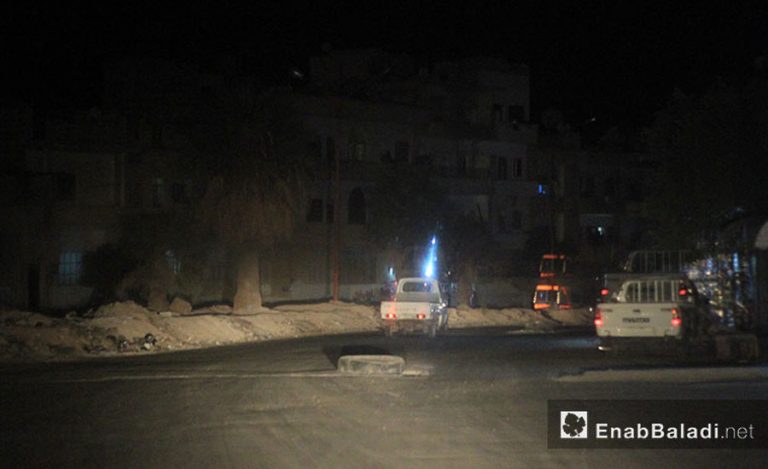Munzer Hammal, a taxi driver from the city of Idleb, doesn't take customers outside the city after sunset, but today is different. He is working until 10 p.m. transporting people between the villages and towns of the province without fear or dread, he says.
Movement at night on the roads between Idleb and its countryside has been limited over the last few weeks due to bandits and muggers, a phenomenon which residents have not known since the opposition took control of the city in March 2015.
Since warplanes disappeared from the skies of the province life has begun to return to normal, which has eased movements between the cities and towns at night, after it had been a “red line” for residents. Hammal says he had previously suffered from numerous obstacles, from warplanes' machine guns targeting the roads to robber gangs.
The driver delivered his customers today to areas “relatively close” to Idleb, such as Binnish, Ariha and Maarat Masreen, telling Enab Baladi that “in the past I would get urgent requests from sick people or someone traveling outside the city, but I refused most of them. But today my work has improved a lot and there isn’t the same danger there has been.”
The province has seen quiet and a decrease in the severity of bombardment since the “de-escalation zone” deal was signed at the start of last May between the guarantor states Russia, Iran and Turkey in Astana.
Warplanes loaded with L39 machine guns have stopped targeting the main roads and the cars moving on them, which had been a starting point in curbing the activities of the bandits.
Alan Zakour, a member of the executive force in Idleb city, told Enab Baladi that it was not possible to stop the bandits entirely, but he said that their activities had been curbed “to a large extent.”
He said the warplanes stopping has allowed people to travel, “mobilizing dozens of cars, which has impeded the robbers who are concentrated in one specific car,” and pointed to security measures used to curb the phenomenon. However, the increased traffic on some routes does not apply to all areas and there are still some roads that are nearly empty from night to day.
The road from Idleb to Ariha is passable at any time, because it is a heavily populated area, but for remote areas or small villages passage on their roads cannot be guaranteed and prevents people from traveling at night.
“Morning is profitable and night is quiet and brutal,” says Al-Khamsini Munir Abdel Kafi, a taxi driver from Idleb, saying that “there is no need to take cars at night, so those who are forced to are few and we are in a war, and it is not possible for anyone to predict what can change within hours or minutes.”
Abdel Kafi told Enab Baladi that “the problems between the rebel groups are enough to prevent you from traveling at night, as a dispute could erupt at any moment. Someone could face problems in a car or other difficulties and you won’t find anyone to help you.”
The province has seen repeated internal clashes between rebel groups, and their checkpoints would arrest civilians or fighters if they suspected they belonged to rival groups who are engaged in an ideological dispute.
This article was translated and edited by The Syrian Observer. Responsibility for the information and views set out in this article lies entirely with the author.


